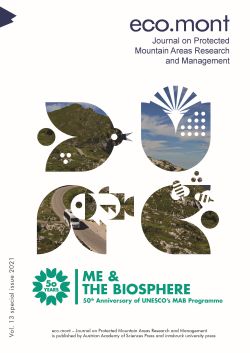
Eco.mont Vol. 13 special issue 2021, pp. 130-135, 2021/11/23
Journal on Protected Mountain Areas Research and Management

The year 2023 will mark the 20th anniversary of the proclamation of the Julian Alps Biosphere Reserve (JABR). When awarded the prestigious title, the Triglav National Park (TNP) Authority was already the managing body of TNP, which constitutes the core and buffer zones of the then-newly designated area. Over the course of time, it has become clear that buffer zone management is instrumental in securing the objectives of the TNP and JABR. This paper discusses aspects of management relating mostly to visitation, education and training, cross-border cooperation, and enhancing the local economy through the collaboration of providers. A bottom-up approach and multi-stakeholder networking as essential components of modern policy-making are the key to success, particularly since sustainable development in sensitive areas is reliant upon fostering a strong and broad community identity and local support for protected areas.
Keywords: UNESCO MAB, Triglav National Park, Julian Alps Biosphere Reserve, identity, management, networking, education, sustainable development, depopulation, wellbeing